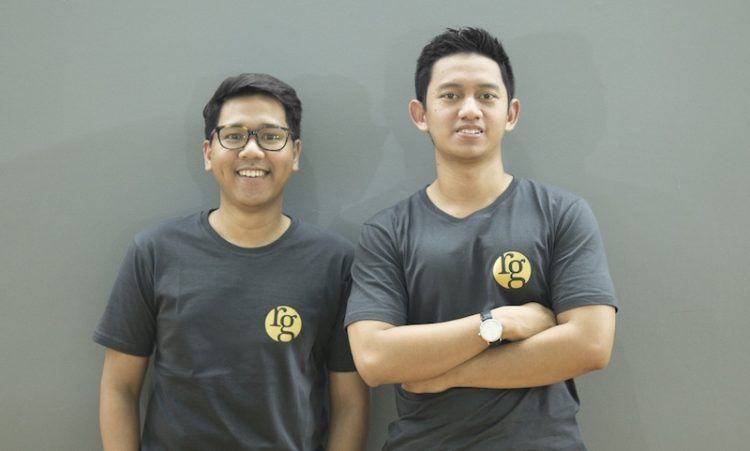
Iman Usman (L) and Belva Devara, co-founders of Ruangguru. Their edtech startup was among the recipients of GSMA’s startup grant. Photo credit: Ruangguru.
Booking.com, a global travel aggregator site, part of NASDAQ-listed Priceline Group, runs an accelerator program: Booking.com Booster.
Last week it announced the winner of its first batch: a Singaporean startup called Backstreet Academy. The startup took home a US$450,000 grant. That’s a large sum for not giving away any equity.
Typical early stage venture capital rounds in Southeast Asia aren’t much higher than that. The median size for a seed round in 2016 was US$500,000, according to Tech in Asia data.
GSMA, a global organization of mobile operators, also runs a startup program. It funds selected startups with cash up to US$323,000, equity-free. Indonesian edtech startup Ruangguru was among the winners of its first batch. The organizers are now calling for a new round of applications.
Google’s Launchpad accelerator also gives away equity-free cash, albeit smaller sums. The main value comes in the form of free access to Google services.
The three corporate-led startup grants mentioned above seek applicants from developing countries. In counties with more advanced economies, like Singapore and Korea, startups can apply for a number of government grants for support in various stages of their lifecycle.
But are grants always a good idea? What should startups consider before applying for one? And what’s in it for the grant giver?
Tech in Asia asked David Soukhasing of Angin, an angel investor network in Indonesia that matches startups with different types of capital; Gibran Huzaifah, founder and CEO of agritech startup eFishery, who received grants to start his company, and later on raised venture capital; and Maxime Bayen of GSMA’s Global Innovaton Fund – the organization behind GSMA’s grant.
Below are edited excerpts of their responses.

Indonesian startup eFishery developed a smart feeding device for aquaculture. Photo credit: eFishery.
When should a startup consider applying for a grant?
Soukhasing: You must have a clear idea for what existing need the grant money is for. “Hey free money, what can we do with that,” should not be the motivation.
Grants can be a booster in the earlier days to develop a minimum viable product and to help founders focus full-time on the business.
Huzaifah: In eFishery’s case, we were building a hardware/IoT product. It takes longer and is more expensive to develop than software. More time and cost means more risk, which makes it harder to get other forms of funding.
Soukhasing: Grants can help bridge that gap. In some more mature markets, startups receive many subsidies, tax breaks, or donations from the government that support them at the beginning of their lifecycle. In countries like Indonesia, there is still comparatively little government support for startups in monetary form.
Startups which deliver a positive societal impact, but have more tricky operations – for example, investing in educating first-time users, may need a grant to support the extra monetary burden.
What’s the motivation for corporations or governments to give grants?
Bayen: In the case of GSMA, we look for potential synergies between startups and mobile operators. A goal is to have success stories of startups and mobile operators working together. The GSMA grant is backed by development funds of the UK and Australia, so it needs to have a positive socio-economic impact.
Financial viability of our startups is important, but we are probably more risk-takers if we see a potential socio-economic impact.
Soukhasing: We see three types of grant givers. Government and public donors are usually interested in the objective to increase the contribution of startups to Sustainable Development Goals. They have no agenda beyond supporting national champions and sending positive vibes regionally. Think of how much Malaysia has put into Magic or Korea into its TIPS/KBAN program, not to mention Singapore.
With corporates, there usually is a string attached and they have some stake in the future progress of the startups. It could be in terms of communication return, so they can say “we were part of the story,” it could also be in terms of pipeline development for acquisition targets. The grant could have some kind of first refusal scheme. Or they see the grantees as market intelligence providers.
Corporates have been giving grants indirectly for a while through programs like education, incubation, and free access to technology. We now see them moving to direct grant allocation.

Street scene in Malang, a mid-sized Indonesian city in East Java. Photo credit: Nurudin Jauhar.
NGOs and family offices are a bit between government and corporate grant givers in terms of strings attached. The philanthropist angle is stronger, but they still expect some stake in future progress in terms of communication return.
What can startups expect from their grant giver?
Bayen: We ask for a number of documents. The due diligence includes a visit as well. Someone from the team will visit, meet with investors, customers, and competitors, to get a full understanding of their services and team. Visits are proven to be the most effective tool to determine whether they are ready for investment.
An independent committee made up of seasoned investors will help select the winners. We build a portfolio that is balanced based on factors like geography.
We don’t expect anything except 50 percent match-funding. If a startup requires US$200,000, we ask them to bring on board US$100,000, either from other investors, or in-kind. If a startup has an office at an accelerator, free software packages, this can be taken into account. It’s a risk-mitigation for us.
The grant is tied to milestones and given in tranches if targets are hit.
Our team will travel to visit the startups a couple of times a year. We organize four main events during the year: most are online, for example, tutorials on how to pitch to mobile operators. There’s also a boot camp where startups meet. We help them build relationships with mobile operators.
We also track the amount of follow-up funding after we invest in them. This is important to us, we’re keen to get additional investors on board.
Are there red flags? What should startups be aware of when applying?
Huzaifah: You need more time and effort on a grant application. If you already have a business that needs to grow, you can’t sacrifice your focus on this administration stuff. The process takes longer than for VC or angel investments.
Soukhasing: Competition is fierce for free stuff. The rationality of selection is not clear sometimes. Some startups get grants while their business case is crap and some solid founders never get anything because their story does not fit the grantor’s KPI. We advise our startups to be super selective and to only apply for the ones they feel they have a strong chance of getting.
Read the small print. Some grants look promising on paper but in reality, they are not that great. For example, some grants can only be allocated to certain spendings like R&D, IP, and not for financing fixed assets.
Huzaifah: Grants can make you complacent. I saw some startups spend most of their time looking for grants rather than building a sustainable business. As grants don’t give enough focus on the business traction, it can lead you as founder to also not giving a shit about it. And that’s the most dangerous thing there is.
Soukhasing: Free stuff is good, but it has to improve healthy things and not hide the bad stuff.
This post Q&A: When grants make sense for startups, and when to avoid them. Experts weigh in. appeared first on Tech in Asia.
from Tech in Asia https://www.techinasia.com/qa-grants-sense-startups-avoid-experts-weigh
via IFTTT
No comments:
Post a Comment